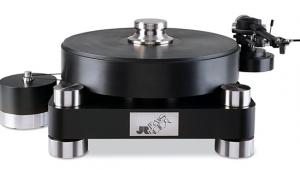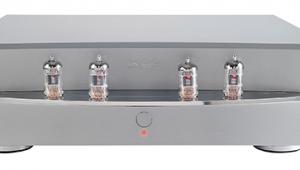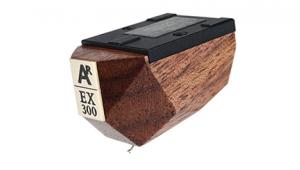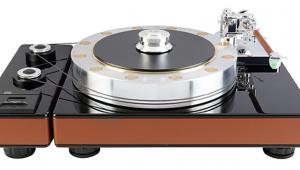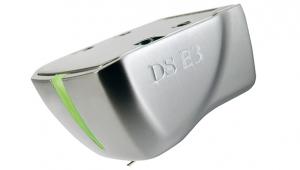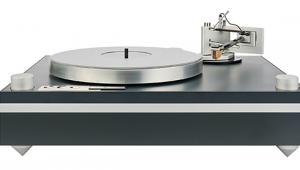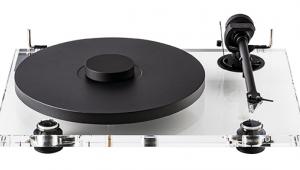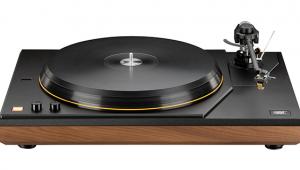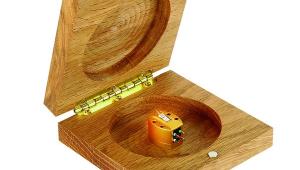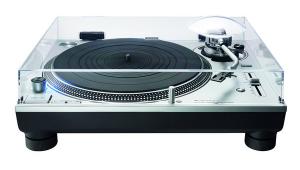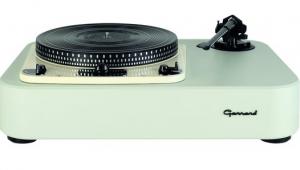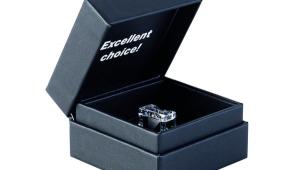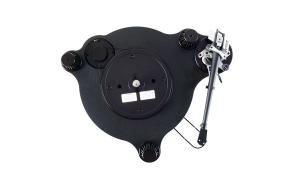Clearaudio Concept (£1100)
If someone had told you, even as recently as 2000, that the market would be overrun with genuinely stunning turntables at sensible prices in 2010, you might have snorted with derision. During the LP’s limbo period of 1985-2005, as it clawed its way back to its current ‘cool’ status, the focus seemed to be on extremely expensive high-end players. That limbo period is now over thanks to CD’s decline, and the black vinyl record is regaining small but steady market share, including crucially an audience amongst those born after CD arrived. Clearaudio has always had affordable turntables for newcomers, but the company created something special with the Concept, one of those rare occasions when the object isn’t merely greater than the sum of its parts: it merits, straight out of the box, a gold star, an Oscar and a Michelin rating.
KING OF CONVENIENCE
You don’t have to be a seasoned turntable user to be struck by the Concept’s special qualities; they’re immediately apparent. For decades, we’ve seen turntables that come pre-fitted with arm and cartridge, all adjustments set at the factory, requiring nothing more than plugging into the mains and the phono inputs of the integrated amp or receiver. Budget decks have always been that way. But the Concept applies high-end standards to entry level convenience and price, and done in such a way that you have to be a churlish hound to look for compromises in the design.
Indeed, the only way you can suggest that ‘Clearaudio cut corners’ is to point out that the chunky, acoustically-dead plinth’s corners are rounded. It’s a sandwich slab made from an unspecified inert material with a Medite-y feel, trimmed with a brushed aluminium frame, with no suspension. Rather, it rests on three height-adjustable pointy feet. But I do not consider the lack of a springy suspension to be economising with a deleterious result: to save money, you compensate for this by positioning it away from physical or air-borne vibrations. Tweakers, if anything, will welcome this because it also encourages them to play with aftermarket feet.
Once it’s freed of the packaging, you see the arm held in place with sticky tape, Styrofoam inserts protecting everything else. It was no more complicated than removing a CD player from its box. I had it making music in four minutes, even with checking the settings post-transit. The external power supply was plugged into the mains and then the back of the Concept, the phono leads inserted into the Audio Research PH5 phono stage, and, later, the line inputs of the Valvet P2 [see p60] and McIntosh C2200 preamps. I had a hefty table cleared for it – the GM Accessori BCD, stupendously over-engineered and spiked to my listening room’s concrete floor – with a couple of LPs primed for play. Off with the stylus guard, and it was instant bliss.
After a few hours running it in, enjoying the sound as it improved, I investigated further. The spookily-invisible, magnetically-suspended tonearm reminded me of the Well-Tempered, if only because it hangs there, but there’s no string holding it in place: two powerful magnets position it in a friction-free manner. Closer study revealed set screws that allow you to play with the arm height and the cueing lever reach, while tracking force is applied with a conventional balance weight. The supplied cartridge operates at 2.4g.
SILENT RUNNING
Overhang and azimuth are also blissfully easy to set, reminiscent of the Syrinx (had it ever been properly manufactured). The only tricky bit, not covered in detail by the instructions, is setting the anti-skating bias, which is accomplished by trimming the leads via a bolt from underneath.
This only affects you should you change cartridges, which I did in order to hear the deck with costlier designs. They included moving coils from Transfiguration, Koetsu and Lyra and MMs from Shure and Ortofon.
A word of caution, emphasised in the owner’s manual, is the need to set the tracking force without an LP on the platter. That made sense because logic dictates that a turntable operates with a record in place, and that the force (and arm height) would therefore be best set with an LP on the platter. Thus the thickness of a record is represented by a stylus gauge’s platform – including Clearaudio’s own.
Blissfully quiet, the Concept is
belt-driven by a decoupled DC motor with low noise bearings, powered by the aforementioned external black box; fans of 78s will appreciate that this is a three-speed deck able to accommodate the higher velocity. The composite 30mm black platter slides over the spindle with little resistance, the bearing itself described as ‘a polished and tempered steel shaft in a sintered bronze bushing, running on a mirror of Teflon.’
Although it positively begs to be tweaked, I avoided any accessories for the turntable itself. The lack of a suspension and easy arm-height adjustment will encourage those among you with ADD (Accessory Deployment Disorder) to try assorted mats – felt, cork, RingMat, Funk, what-have-you – while the chassis’ light weight and flat underside will send you running to the drawer that you’ve filled with spikes ’n’ feet collected over the years. I didn’t even try a record clamp or weight – another source of innocent fun this might inspire you to exploit.
MASS APPEAL
Creedence Clearwater Revival’s penultimate studio LP, Pendulum, is an absolute treasure featuring gems like ‘Molina’, ‘Hey Tonight’ and ‘Have You Ever Seen The Rain’, a showcase for one of rock’s greatest voices – John Fogerty’s. It was that voice, as much as the churning guitars and solid bass, that had me choose it for my first taste of the Concept, which returned the compliment by delivering rock-hard punch.
Lord knows why, but I wasn’t expecting the deck to reproduce sound with such mass or impact. The sheer power of ‘Molina’, one of Creedence’s more hard-driving numbers, was palpable even through compact speakers, like the Sonus Faber Cremona Auditor Elipsa or Rogers LS3/5A, with fat, tactile, flowing bass. It has been something of a curse for turntables that their own mass is reflected in the sound they deliver, featherweight decks seeming capable of only minimal bass, with behemoths producing lower registers that you actually feel. The Concept, while hardly pretending that it’s an SME 30, never betrayed its sylph-like form.
Better still was its control of the bass, not just the quantity nor even the quality: on ‘Have You Ever Seen the Rain?’, the sound is full enough to create a dense and busy sonic field, wide and deep, yet sparse enough to allow the user to hear each member of the band. Homing in on specific instruments proved effortless, a boon for those moments when you’re trying out a new component, or hearing a release for the first time and don’t yet feel like wallowing indiscriminately in the wash of sound.
Horror of horrors, it actually reminded me of watching Avatar and consciously forcing myself to veer from concentrating on specific 3D details to savouring the bigger picture. So detailed yet coherent is the Concept’s delivery – and I am referring to it with its own cartridge – that you suddenly appreciate something else about the deck: in this case, the cost of a truly pedigreed performer, with a heritage going back 32 years, has been lowered by a staggering amount.
It’s important to place this in context, for we are discussing a German product – in itself, reason enough to marvel at a low price – composed entirely from proprietary parts, packaged to be foolproof to set up and operate, and yet styled to suggest a much larger ticket. Add this the final gift, of true ‘audiophile-acceptable’ performance, and you’ll realise that we are dealing with something beyond the ordinary.
Which led me to the sorts of discs I only normally wheel out on high days and holidays: sonic spectaculars. First was the true stereo version of the Dave Clark Five’s ‘Glad All Over’, which is powerful enough just for its bass and rhythm section, but which soars above the mean for its sax element. It begs to be played loudly, at stomping levels that presage Slade. The Concept kept it all together, almost matching my reference system, the SME 30 with Series V, for detail, if not for absolute extension and transparency.
What it clearly avoided was the ‘record player effect’, and I mean that in the derogatory system-in-a-suitcase sense of cheap Pye Black Box-type portables, which present a wash of sound, stripped of details.
DIGGING IN THE DIRT
But there’s a place for everything, and I’m sure some modern converts to vinyl would be just as happy with a refurbished SoundBurger. Which would be a great loss on their part, because the Concept – while not an ‘introductory’ turntable – excels at conveying just why vinyl remains the choice of the cognoscenti.
To prove to myself, if not to the world of Gallagher/Cobain wannabees, that such a refined beast as the Concept could, if pushed, be as grungy or raucous or sneering as modern tastes demand, yet remain utterly free of digital artifice, I turned to the recent
high-quality vinyl pressings of Nirvana’s oeuvre.
Contradictory as it may seem – audiophile treatment for music deliberately fashioned to antagonise, annoy and possibly even enervate – the Concept found the hidden musical depths buried beneath the cacophonous sturm und drang. It reveals to inquisitive listeners the layers of sound that constitute what may be considered the evil twin to Phil Spector’s ‘Wall of Sound’. (Note the irony, given that Spector’s the one inside for murder.) Instead of pile-driving excess, the sound acquired the majesty its devotees attribute to it for political and philosophical, rather than sonic reasons.
This is not to be confused with the far more precisely defined sound of the Ramones, which possesses as much majesty as Nirvana ever did, but without angst-riddled pretence. ‘Rockaway Beach’, easy to write off as a mere ditty when compared to the Wagnerian turbidity of, say, ‘Tourette’s’, sounded almost anthemic, which probably would find the now-departed members of the grouped keeled over with laughter in the afterlife.
VERDICT
Those new (or returning) to LP have never been so spoiled for choice for entry-to-mid-price ‘turn-key’ turntables. Clearaudio’s rivals – Thorens, Pro-ject, Funk and the ‘blue-chip’ default, Rega – all make sublime alternatives. But this deck offers styling and finish worthy of a £2000 package, and an arm ideal for a cartridge upgrade. The Concept is the most covetable bargain since NAD’s C315BEE integrated.
Sound Quality: 85%



